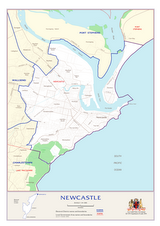A Hunter Just Transition Fund
Today, on the foreshore of Newcastle Harbour, Lee Rhiannon, State Upper House MP, launched the NSW Greens Coal Policy with Greens candidate for the seat of Newcastle, Michael Osborne, Greens candidate for the seat of Wallsend, Keith Parsons, Greens candidate for the seat of Maitland, Jan Davis and Greens candidate for the seat of Upper Hunter, Bev Smiles.
The policy is shown in full below.
Climate change is happening and it is critical that the Government commit to a “just transition” away from coal dependency for Hunter communities, to support job creation and the retraining and the seeding of new sustainable industries paid for by a levy on existing coal mines.
Michael Osborne stated that, if elected, he would introduce a private members bill to establish a Hunter Just Transition Fund to support the move away from climate changing activities like coal burning to renewable industries like the manufacture of solar panels and wind turbines in the Hunter.
Video: The Jodi McKay Policy Challenge
The Greens NSW Coal Policy
Revised August 2006
Principles
1. The overwhelming scientific evidence of human-induced global warming demands that each state and nation substantially reduce greenhouse gas emissions and bring about an end to the fossil fuel-based economy.
2. NSW, as a major coal producer, user and exporter, has a particular responsibility to break the dominance of the coal corporations and urgently begin the transition to a low carbon and efficient economy which will increase the number and quality of jobs.
3. Given that coal mined in NSW is a major source of greenhouse gases on a national and global scale, The Greens are committed to phasing out the coal industry and its replacement with a jobs-rich clean energy economy.
4. Coal mining results in massive damage to:
4.1. the social and economic viability of communities in the vicinity of coal mines;
4.2. ecosystems, rivers and the geological integrity of landscapes; and
4.3. other wealth and employment generating activities including farming and tourism.
5. As the coal industry has become increasingly mechanised and more capital intensive, the number of jobs in coal mining has significantly reduced in NSW and around Australia. This stands in stark contrast to the enormous employment potential of renewable energy, energy efficiency and public transport where export industries could be developed based on successes in the domestic market.
6. Increasing the capacity of the NSW coal industry will not only damage the environment and employment potential but also frustrate and foreclose on the development of a low carbon economy
Policy Detail
The Greens NSW
7. oppose the development of any new coal mines or the expansion of existing coal mines. We also oppose the expansion of coal handling infrastructure.
During the transition to a low carbon emissions economy, the nation’s energy and metallurgical needs can be satisfied by existing coal mines
8. will work towards stopping development consent and the granting of export licences for all new coal mines.
9. will work to improve the mine development assessment process to take full and unbiased account of:
9.1. greenhouse gas emissions from coal usage whether it is exported or burned in NSW;
9.2. greenhouse gas emissions released during the mining and transportation of coal, including coal seam methane fugitive emissions;
9.3. adverse economic, social and health impacts on local communities;
9.4. damage to rivers, streams and other waterways;
9.5. noise, dust and transport related impacts on local communities;
9.6. damages to the landscape;
9.7. reduction in tourism potential;
9.8. damage to agriculture; and
9.9. loss of cultural and natural heritage.
10. believe that that an immediate start should be made to the transition of the electricity industry to a renewable energy and energy efficiency basis.
11. will work to ensure that greenhouse gas emissions from metallurgical uses of coal are minimised by:
11.1. enforcing world’s best practices in process efficiency;
11.2. maximising feed-stock recycling; and
11.3. a state, national and global transition to selecting manufactured materials that minimise embodied emissions
12. will work to ensure that the operations of existing coal mines conform to the world’s best practices in industrial relations for mineworkers, occupational health and mine safety, environmental protection; and are designed to minimise impacts on local communities including noise, dust and amenity.
In particular, The Greens will work for:
12.1. increased enforcement of current environmental standards and requirements and higher penalties for breaches of mine consent requirements;
12.2. the establishing of local environmental monitoring committees to monitor and audit the performance of all coal mines;
12.3. the development of regional industry-wide environmental monitoring programmes;
12.4. the development and implementation of a programme for revegetation (with indigenous species) of disused coal mining land. Reforestation components of such activities should not be allowed to be used as a carbon dioxide sink in any emissions trading scheme; and
12.5. improved monitoring of the environmental consequences of abandoned mine sites and in particular their impact on the aquatic environment.
13. support the phasing out of all existing subsidies to coal mining . This includes immediately ending the Federal government’s diesel fuel rebate for mining operations.
14. are committed to “just transitions” for communities that have traditionally derived income from coal mining operations, to support job creation and the development of a secure economic future for those communities. Funding for retraining and the seeding of new industries in coal communities should be paid for by a levy on existing coal mines.
15. believe that where coal mines are closed, there is an urgent need for full rehabilitation, not only to restore the area of mine operations but also to protect water quality in all affected rivers and streams.
16. reject the promotion of “clean coal” by politicians and coal lobbyists as nothing more than a marketing tool to disguise the devastating environmental impacts of coal mining and use. Carbon capture and storage (geosequestration) is an unproven technology that is likely to be expensive, risky and limited by availability of appropriate burial sites.
17. oppose substantial funding of "clean coal" research and development at the expense of sustainable energy technology.
18. will campaign for a levy on all existing coal mines to pay for:
18.1. just transitions for communities that are currently economically dependent on coal mining;
18.2. mine rehabilitation where mine owners have failed to leave adequate resources to restore the local environment and protect rivers, steams and ground water; and
18.3. investment in renewable energy and energy efficiency.




